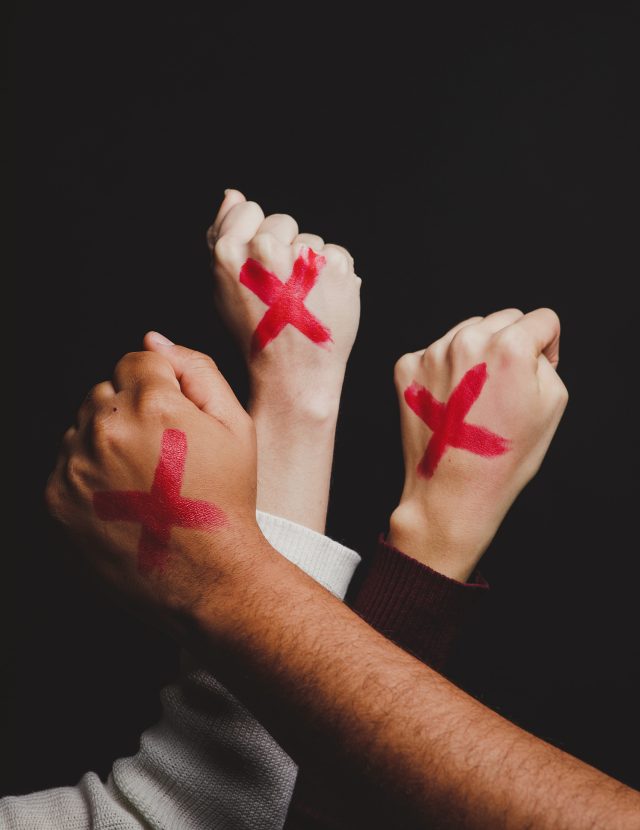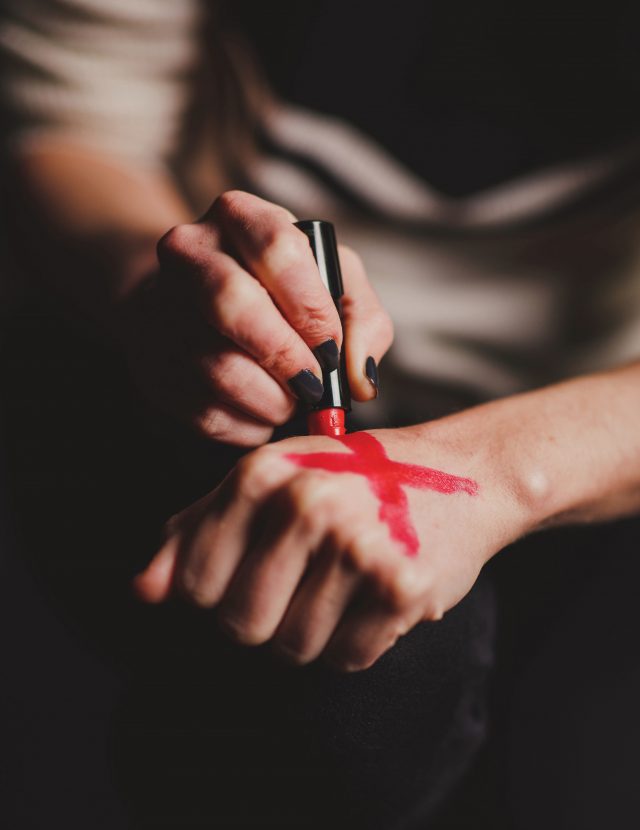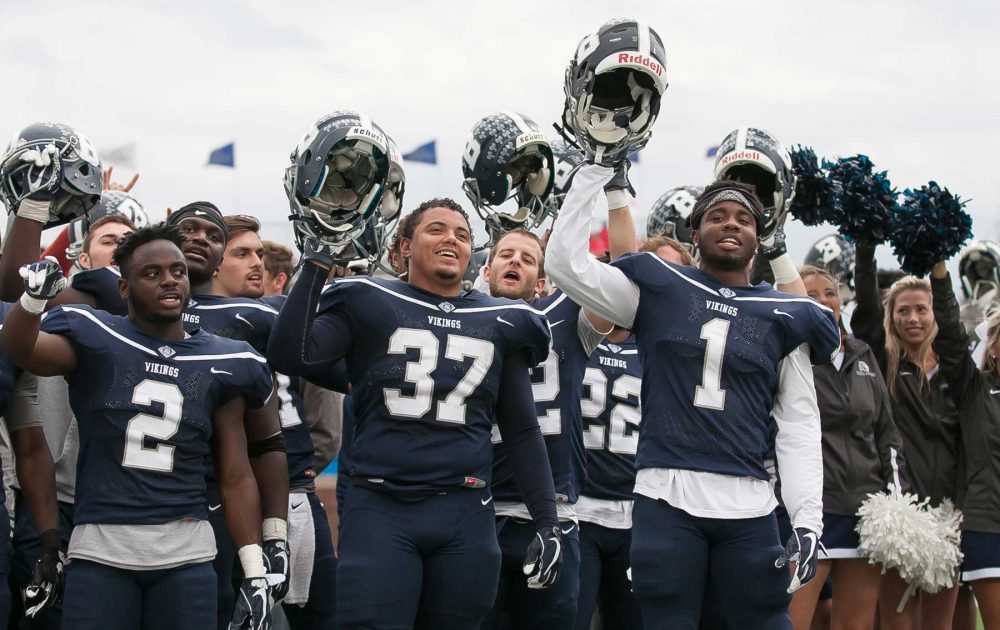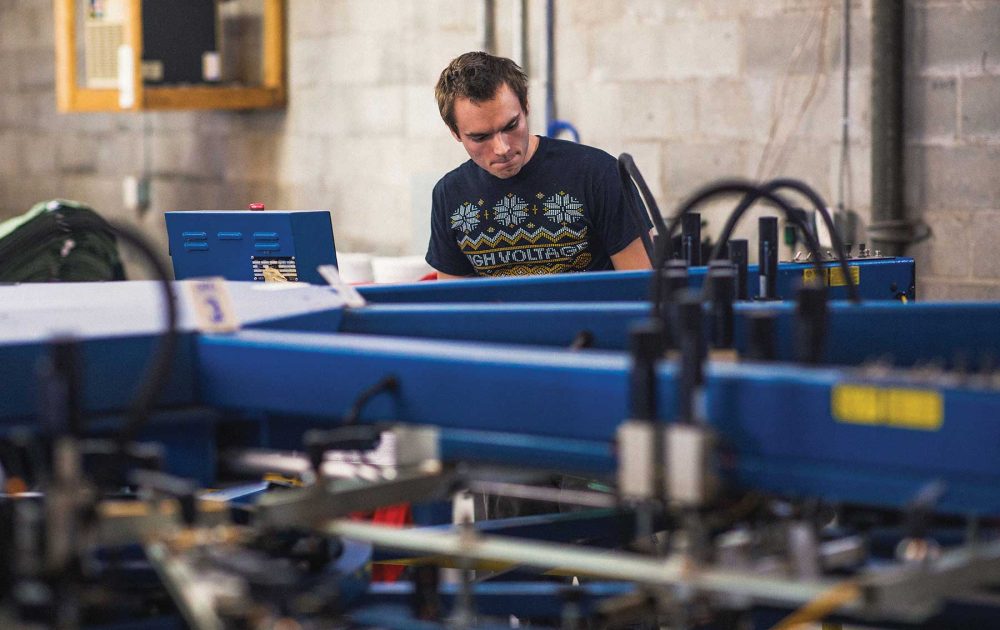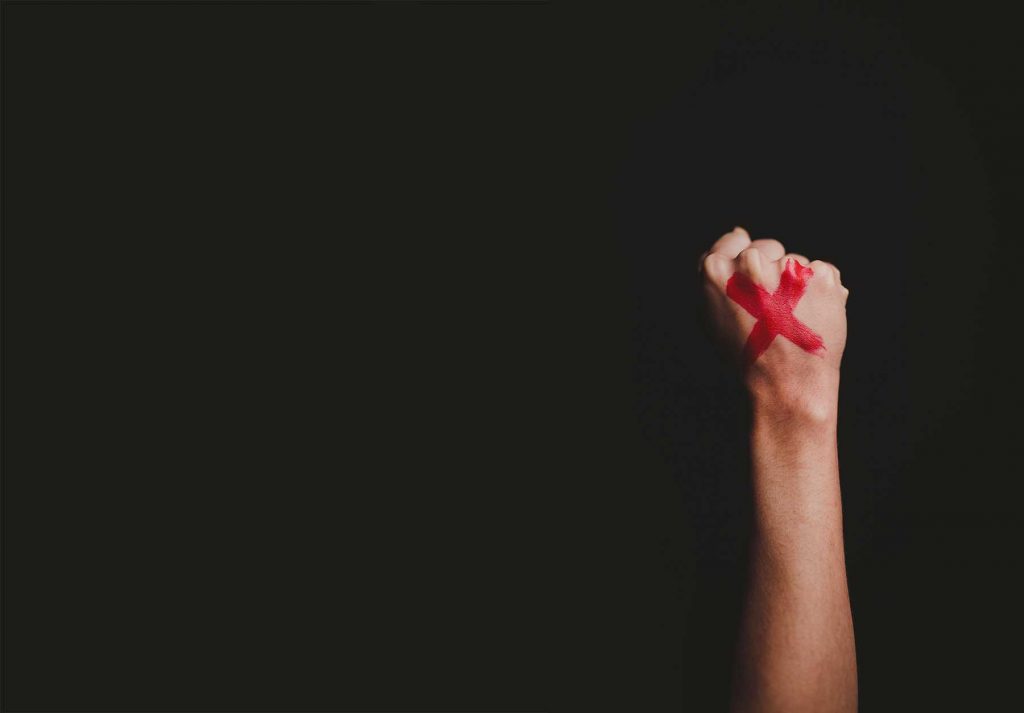
End Slavery Georgia serves survivors of sex trafficking.
*Name has been changed for protection
Jane* didn’t hesitate when she saw he’d left the door unlocked.
He had just finished; another faceless man in a suffocating sea of the same faceless men who filtered through her life every day as they had for the past five months.
“They normally locked the doors to the rooms,” Jane recalls of that day. “But he forgot to, and I didn’t even think about it. I ran.”
Adrenaline exploded through every cell in her body, pushing her legs as fast as they could go, out of the spacious, beautiful house, fleeing down urban streets. She huffed to a halt in a gas station. She worked to level her panic, to push her emotions down like built-up bile.
“I was freaking out… I didn’t want to cause a scene,” says Jane.
But it was hard for Jane to control the ripping anxiety, fearful that the man who had imprisoned her for nearly half a year would walk through the door at any moment; the man who had become her sex trafficker.
How It Started
Comparatively, Jane had a normal life growing up, quite unlike the grainy, desolate images that come to mind when one thinks of sex trafficking. She was brought up in a middle-class home and never knew poverty as a kid. She was also fiercely independent during her late teens.
“I was working a part-time job and going to college full time, but money was super tight,” says Jane. “I was living pretty much on my own. I had roommates, but we weren’t close.”
Under financial stress, Jane spoke to her cousin about finding another job. It was from her cousin that she learned how to meet men for money online.
“That’s how it started. I went on a website because my cousin was doing it, and then I found out a whole bunch of other women were doing it and it was going fine for them.”
Jane would see men who would take her on dates, have sex with her and pay her well. One man in particular paid her the most and requested to see her the most often.
“I started seeing only him,” she says. “I’d been seeing him for a while. His house in Atlanta is huge. But the two top stories, they were kept from me. I never knew what was up there.”
One day after entering his home like any other day, she wasn’t allowed to leave. The cables holding her world together snapped and fell away. She went from seeing men on her own terms to being imprisoned on those top floors and pimped out on a regular basis.
“Other men would come, and he would pimp me and the other people (he was holding captive) out,” she says, her voice fading. “At that point, I didn’t have any control.”
As she looks back on that nightmare, Jane says she sees now that her pimp strategically and purposefully targeted her based on several factors. He knew she wasn’t close to her parents and didn’t talk to her family often. She was isolated. Furthermore, he didn’t reflect the stereotypical mental image of a pimp. He looked normal and even had a legitimate job, Jane says.
“But he didn’t work at it very much, I later found out,” she says. “Most of his money was coming from women. Also, he would occasionally have us get on our social media sites and post a random status, so it looked like we were okay. Like we were still there.”
Jane escaped a month before she turned 21.
Plunging into addiction
Sex trafficking is an immensely prevalent criminal market in the United States, though most instances go unreported. So far, there have been 3,186 reported cases of human trafficking in the country this year, 150 of which were in Georgia, according to the National Human Trafficking Hotline.
Traffickers target victims and then use violence, threats, lies, debt bondage and other forms of control and manipulation to keep victims in the sex industry for profit.
Sex trafficking knows no socioeconomic boundaries and exists within a plethora of venues and businesses, such as fake massage businesses, escort services, residential brothels, truck stops, strip clubs, hotels and motels and even public streets, among many other places.
Once Jane escaped her captor, she began working random jobs to keep her head above water. She was ill-equipped to deal with the stress and trauma she had endured for months. To numb the violent reality of her past, her present was hazed by chemicals and her therapist became drugs and alcohol. “I’d never had addiction problems before. For a little while, it seemed like I could pretend none of it ever happened. Using (drugs) was the only way I was getting through the days. I was using so much so I couldn’t think about (what happened to me) to the point where I was almost killing myself every day. I must have gone to the ER more than 20 times.”
After so many hospitalizations, Jane couldn’t deny she needed treatment. A hospital put her in touch with a Crisis Intervention program. She was later was sent to Highland Rivers in Rome, to the Women’s Outreach program.
But she ended up checking herself out of the Women’s Outreach program, which specializes in drug and alcohol addiction, but not the sexual abuse roots of her trauma. Jane set off into the streets one night and sought shelter near a gas station.
She had few belongings, no money and no working phone. Running out of options, Jane tried to get in touch with some people she knew in Atlanta, who would pick her up and take her back to her life, much as it had been before.
“I knew that’s where I was going to wind up, but I always told myself that it would be different,” says Jane. “It would be okay. It becomes such a part of you that you just go back, and you don’t even realize what’s happening to you.”
END SLAVERY GEORGIA
Feeling unsafe at the gas station, Jane recalled a church nearby. She headed toward it with plans of sleeping in the parking lot.
“I figured it would be safer to stay there,” says Jane. “They were having some sort of dinner in the church.”
That church was Journey Church where Debbie Crumbly pastors. Crumbly, her daughter Danielle Mullen and several other women were dining in the church, having a Ladies Ministry meeting.
“We were talking about what we could do for outreach services, to really put some meat to the bones when it comes to helping people in the community,” says Debbie, “when across the parking lot walks what we thought was a 12-year-old.”
Debbie and Danielle invited Jane to come inside and eat with their church group. Debbie says naturally, the women weren’t going to let Jane stay in the parking lot and planned to get her a room at a hotel for the night. The next day, they would develop a game plan to help her more. “We were driving to the hotel and something told me, ‘Ask her if she was okay with staying there,’” Danielle remembers. “It was a nice hotel but I asked, and she hesitated, and I just knew. So, I called my husband. She ended up staying with me that night.
And for the next year, she stayed with us.” After sharing her story with Debbie and Danielle, Jane lit the fire of the cause for which the women were searching. End Slavery Georgia was born from there to serve and help a population that often goes forgotten.
“It flipped the light on for us,” says Debbie, adding that with Rome’s expansive medical community, range of services and local support, Northwest Georgia is in the perfect position to help survivors of sex trafficking.
End Slavery Georgia became incorporated in April of 2016, and is a 12 to 16-month program serving female survivors of sex trafficking ages 18 and older. By partnering with community groups such as the Sexual Assault Center of Northwest Georgia, drug and alcohol counseling and other therapeutic services, End Slavery Georgia will focus on holistic healing for survivors.
“Our aim is to help them get their lives back on track,” says Debbie. “We’ll help them work through their trauma, find employment that could turn into a career and work with them to get housing. We want them to be self-sustainable and safe.”
One of the biggest issues with sex slavery in Georgia is local law enforcement not being educated on recent legislation and red flags, Debbie explains. “A lot of them haven’t been educated and updated on new laws and resources that they have,” Debbie says. “They’re doing a great job, but a lot of that information has not been passed down. It’s the same with our medical community, too.”
But rescuing trafficking victims goes beyond detecting red flags. It’s about broadening your horizons and looking for other factors.
“They see a young lady who they’d normally consider a prostitute, but they need to be looking around for the trafficker because he’s close by,” she says. “At the hospital, don’t just look at the patient and what’s going on with them, but look at the people with them. Those are red flags that could allow us to rescue someone.”
Debbie says the average trafficker makes $32,000 a week on seven to 10 women, and that Atlanta is a hotbed for trafficked women who are Hispanic.
“It’s absolutely everywhere,” she says. “It crosses every societal barrier. We deal specifically with adult female traffic survivors, but we take calls from anyone and get them help. We get a lot of calls about children. If the victim is underage, my first call is to GBI’s Child Exploitation Division and DFCS.”
Both Danielle and Jane say that the internet makes human trafficking dangerously easy and accessible.
“It’s all online now,” says Jane. “That’s how it all starts. And you don’t realize what you’re getting yourself into because so many women don’t have that same experience. The jokes about getting a sugar daddy… you don’t think about what that could mean.”
“Traffickers have started used emojis to communicate what they need,” says Danielle. “They used to text the words ‘I want a girl here at 12 o’clock.’ Now, they send emojis with a girl symbol, an umbrella symbol and the number 2. That tells them they want a girl, they’re going to do intercourse but wear a condom, and they want her at 2 o’clock.”
Social media is also a tool utilized by traffickers to prey on underage girls. Danielle says middle school-aged kids are a prime target because they’re active on social media, are at an age where they have low self-esteem and may be experiencing familial issues along with the stresses of puberty. “There are so many kids now that have phones and they get in contact with these people who promise them everything,” says Danielle. “When parents look at their texts and messages, they think they’re talking to another kid using emojis. When really it could mean a lot more.”
THE NEXT RIGHT THING
When people engage in victim-blaming, saying the women always had a choice, that they should have known better and that it’s all their fault, Debbie and Danielle say their experiences spent serving victims and survivors discount that completely.
“It’s hard for us to imagine what it’s like to have lost all hope,” says Debbie. “But they truly reach that point to where they don’t see hope anymore. But that’s what we do at End Slavery. In everything we do, we help them find a way to put hope back in their lives again.”
For Jane, her year with Danielle was a challenge, but also one of the best things that ever happened to her, she says.
“I didn’t really understand the whole addiction aspect, how it was rooted in my trauma,” says Jane. “I stayed clean when I was with Danielle for the first couple of months, but I ended up relapsing. She helped me go to detox. I tried again. And I relapsed again. I look back and I cringe sometimes. She kept pushing me to get help. She never lost faith in me.”
Jane has since received in-depth trauma treatment which has helped her cope with her victimization and her subsequent addiction. She is currently in a Sober Living home in another state, has a great job and a community of women supporting her.
“We’re all alcoholics and addicts, and we’ve all been through trauma,” she says. “We don’t all have the same trauma, but when you’ve heard someone’s deepest, darkest secrets, and you’re able to share yours, it’s hard not to make friends.”
Jane says she knows her journey is uphill, but it will be worth it. She plans to fight for and savor every day of being clean and free.
“I’m literally just trying to do the next right thing every single day, if that makes sense,” she says. “There are times when it gets hard. But the important thing is having people around me, having community. Once you’re around people who love you, even though you absolutely hate yourself, no matter how hard you fight it, you realize you can’t anymore. And then you realize people aren’t lying to you. They actually care.”
Of End Slavery Georgia and her adopted family in Rome, Jane says her heart is full of hope that their mission is becoming a reality and scores of women will be rescued, just as she was.
“I’m so proud of them. That first year I was with Danielle, she was talking about how she wanted to start End Slavery. It almost makes me want to cry that she’s doing it. I’m so grateful for her and I’m so proud of her. She’s my best friend.”

